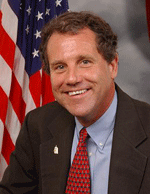
Fresh from victory in Ohio’s knock-down drag-out Senate race, Sherrod Brown is happily preparing to exit the rough-and-tumble House for the mannered courtesies of the Senate. Brown ran his campaign on familiar themes — middle class economic issues and criticism of NAFTA-type free trade policies. He was a vocal member of the House anti-free trade coalition — made up of both right wing Republicans and liberal Democrats such as fellow Ohio congressman Dennis Kucinich and Vermont’s Bernie Sanders — that used to battle then-speaker Newt Gingrich and President Bill Clinton in the ’90s. Once he takes his Senate seat, Brown will be serving on Senator Ted Kennedy’s Health, Education, Labor and Pensions Committee. He told us his top targets will be Iraq, trade, and the pharmaceutical industry.
Mother Jones: What do you think should be done about Iraq?
Sherrod Brown: Re-deploy. Troops out within 18 months to two years. I think that time should be shrunk now because things have gotten consistently worse, obviously. The Iraqis will never do what they need to do in terms of cooperation among the Shiites, Kurds and Sunnis, and in terms of building the police and military security forces, until they know we’re leaving.
MJ: What do you want to do on the Health and Education Committee?
SB: FDA reform — wrestling the agency away from drug company influence. In my 14 years in the House, I’ve seen a very good agency, the Food and Drug administration — one of the best public agencies in the world, frankly — turn into a shadow of itself because of drug company influence. I think the best way to fill the donut hole [the coverage gap in the Medicare drug benefit] is to negotiate drug prices. When you negotiate drug prices on behalf of 40 plus million beneficiaries, the donut hole begins to shrink.
MJ: How about trade?
SB: We will not give President Bush the kind of fast track authority he has had in the past. I have no doubt about that. The question is: what do [will] we do instead? The first option is “first, do no harm.” That means don’t pass trade agreements without environmental and labor standards, without food safety standards — trade agreements that continue to squeeze the middle class in this country and don’t help the working poor in [other countries]. Ultimately, I think [that] means renegotiating some of these trade agreement.
MJ: Any interest in being Vice President?
SB: No. But anybody that runs for the president will have to go through Ohio, literally and figuratively. The Democrats need to nominate somebody that will be an economic populist, that will stand up for the middle class, that doesn’t just want to increase the minimum wage but somebody that will work to put the government on the side of working families. And that means different trade policy, standing up to the drug industry, taking on the oil industry. It means showing that the Democratic Party is a progressive, populist party.











